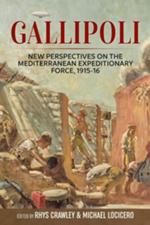Generally conceded to be doomed from the outset by the most recent historiography, the Gallipoli campaign still arouses heated controversy. In a new compendium of original research by an impressive array of established and up and coming scholars, Gallipoli: New Perspectives on the Mediterranean Expeditionary Force, 1915-16 explores various aspects of the Allied military effort to force a passage through the Dardanelles Straits and eliminate Ottoman Turkey from its Central Powers alliance. Phylomena Badsey: Care giving and naval nurses; John Bourne: 7th North Staffordshire Regiment; Stephen Chambers: Prisoners of war; Alexandra Churchill: Evacuation of the peninsula; Jeff Cleverly: Suvla Bay landings; Rhys Crawley: Mediterranean Expeditionary Force Headquarters; Brian Curragh: Lieutenant-General Sir Bryan Mahon and 10th (Irish) Division; Peter Doyle: Gallipoli terrain; Katherine Swinfen Eady: 29th Division staff officer; Meleah Hampton: First Battle of Krithia; Peter Hart: Royal Naval Division; Simon House: Corps Expeditionnaire d’Orient; Gavin Hughes: Irish regiments; James Hurst: ANZAC landing; Rob Langham: Highland Mountain Brigade; Michael LoCicero: Krithia Nullah operations November-December 1915; Linda Parker: British and Australian chaplains; Ross Mahoney: British airpower; Simon Peaple: Grand strategy; Chris Pugsley: New Zealand military performance; David Raw: Hunter-Weston-Egerton feud; Chris Roberts: Australian brigade command; Rob Stevenson: 1st Australian Division; Tom Williams: Territorial divisions at Suvla Bay and Ritchie Wood & John Dixon: British and Australian tunnellers.

Gallipoli : new perspectives on the Mediterranean expeditionary force, 1915-16
ISBN: 9781804515662
Format: Paperback
Publisher: Helion & Company, Limited
Origin: BT
Release Date: October, 2024


